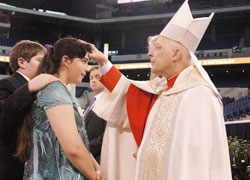175th Anniversary Mass
Cardinal reflects on anniversaries, the Church in the U.S.

Cardinal Francis E. George of Chicago confirms Alisha Webber, a member of Holy Family Parish in Oldenburg, during the May 3 Mass at Lucas Oil Stadium in Indianapolis that celebrated the 175th anniversary of the Archdiocese of Indianapolis. (Photo by Sean Gallagher)
By Sean Gallagher
Cardinal Francis E. George of Chicago was among the 17 bishops and two abbots who came to Indianapolis on May 3 to celebrate the 175th anniversary of the founding of the Diocese of Vincennes.
As the current president of the U.S. Conference of Catholic Bishops and the archbishop of Chicago, he is a prominent leader of the Church in this country.
He was interviewed by The Criterion via e-mail a few days before the anniversary Mass.
Q: When the Diocese of Vincennes was erected in 1834, it included the eastern third of Illinois and a small village on the shores of Lake Michigan called Chicago. In light of those historical beginnings, what will it be like for you to come to Indianapolis and worship with tens of thousands of Catholics from across central and southern Indiana to celebrate 175 years of the Church, not only here, but, in a sense by extension, in Chicago as well?
A: We live lives of habit, and every once in a while the curtain of ordinary living is drawn back to reveal the greater significance of what our lives are about.
Coming to Indianapolis for the anniversary of the Diocese of Vincennes will be a moment to recognize how God’s Providence guides the Church through the centuries, strengthening the structures needed for us to live each day in faith and love.
Q: The tens of thousands of Catholics that will gather for worship on May 3 in Lucas Oil Stadium in Indianapolis will be a dramatic manifestation of how God has blessed the Church in this area of the country over the past 175 years. The Archdiocese of Chicago has experienced even more tremendous growth over that time. How is coming together in this way to celebrate the ways that God has blessed us an important thing for Catholics in this part of the country to do?
A: Our Church is public, and God never comes to us alone. Occasions such as this remind us that the Church is global, universal, by her very nature.
Q: Last year, the first four dioceses created from the Archdiocese of Baltimore celebrated their bicentennial. The Archdiocese of Indianapolis is celebrating 175 years this year. Your archdiocese will be doing the same nine years from now. And many other local Churches across the country will celebrate significant historical milestones in the years to come. As you help lead the Church in this country at this time in its history, how do you see that it has matured over time? What do you see as areas of growth in the life of faith for the faithful as a whole in the years to come?
A: Areas of growth are first of all invisible because grace depends on the action of the Holy Spirit.
Progress for Catholics means growth in holiness, and maturity is measured by our ability to share the gifts of faith and grace with others.
Several saints and candidates for sainthood mark the history of the Church’s growth in Indiana, but most of those canonized from the United States have been immigrants to this country. We should look for signs of holiness among those born here; then we’ll know we’ve grown in the life given us by God through the Church.
Q: In 2004, you gave an address to Pope John Paul II on the occasion of the ad limina visit of the bishops of Illinois, Indiana and Wisconsin. At that time, you noted how the Church’s mission in this country was threatened by internal divisions, by external threats to the Church’s freedom from courts and legislatures, and by a public conversation that was unable to address the common good and was marked by an understanding of freedom at variance with that held by the Church. Five years after giving that address, do you think the situation has changed for the better, the worse or has largely stayed the same? How?
A: The situation is in flux, as it always is.
Maybe the dangers are clearer today, but the greatest danger lies in an inability to read the signs of the times.
The Church shares the lot of the societies in which she lives; and it is arguable that the social and legal conditions of our shared life in this country have become more oppressive in recent decades.
Q: On this occasion when the Church in central and southern Indiana is celebrating its history in this country and during a time when other local Churches will be doing the same, what are some ways that you would suggest that Catholics in America, both as individuals and as a body, can meet those threats and, in positive ways, can shape the American public conversation for the common good?
A: Keep before us the proclamation of the Kingdom of God.
Don’t attack people personally, but be clear on principles. Never feed the forces that work to divide the Church, whether on the left or on the right.
Protect the Church’s freedom to be herself, in law and in custom. Keep in mind that the Church is universal and therefore never fits perfectly in any particular society or country, not even our own.
Trust in the providence of God. †
